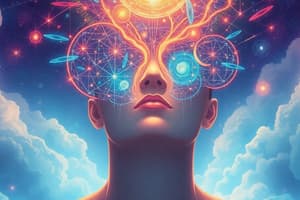Podcast
Questions and Answers
What does self-identity include?
What does self-identity include?
Roles, social groups, and relationships that define who we are in various contexts and over time.
What is self-regulation?
What is self-regulation?
The process of controlling one's behavior, emotion, and thoughts in the pursuit of long-term goals.
What is self-awareness?
What is self-awareness?
The capacity to introspect and recognize oneself as an individual separate from the environment and other individuals.
Match the following concepts of self with their descriptions:
Match the following concepts of self with their descriptions:
What is self-consciousness?
What is self-consciousness?
What does deindividuation refer to?
What does deindividuation refer to?
What is self-efficacy?
What is self-efficacy?
Flashcards are hidden until you start studying
Study Notes
Self-Concept
- Encompasses various elements that shape one's perception of self, including identity, regulation, awareness, consciousness, and efficacy.
Self-Identity
- Consists of roles, social affiliations, and relationships that define an individual in different contexts and across time.
Self-Regulation
- Involves managing one’s emotions, thoughts, and behaviors to achieve long-term objectives.
- Crucial for personal growth and maintaining focus on goals.
Self-Awareness
- Capacity for introspection, recognizing oneself as distinct from others and surroundings.
- Carl Rogers identified two dimensions of self: the Ideal Self and the Real Self.
- Ideal Self: The aspirational persona an individual wishes to embody.
- Real Self: The individual’s actual perception of themselves, encompassing current attributes and behaviors.
Self-Consciousness
- Involves heightened awareness of oneself in social contexts, often linked to fear of judgment or criticism from others.
- Can lead to increased anxiety in social situations.
Deindividuation
- Refers to a diminished sense of personal identity and accountability experienced in group settings.
- Can result in behavior that deviates from individual norms due to anonymity or group dynamics.
Self-Efficacy
- Represents an individual’s belief in their ability to perform successfully in specific situations.
- Strongly correlated with self-esteem; higher self-efficacy often leads to better performance and outcomes.
Studying That Suits You
Use AI to generate personalized quizzes and flashcards to suit your learning preferences.




